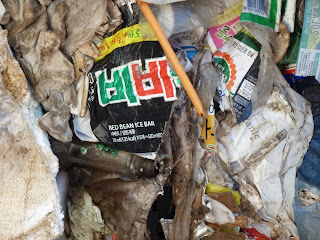EcoWaste Coalition Warns Families against Danger from Small Button Batteries
Some bad things come in small packages.
The EcoWaste Coalition hammered home this message as it reminded parents of the hazards of accidental ingestion of button batteries containing acids and heavy metals.
As part of its campaign to raise awareness on “Clean and Safe Homes for Zero Poisoning Incidents,” the group drew attention to the choking and ingestion hazards of button batteries that can cause chemical burns and put a child’s life in highest danger.
Data obtained by the EcoWaste Coalition from the UP National Poison Management and Control Center (NPMCC) indicate that button batteries is number three among the top 10 poison agents in 2013 in terms of in-patient referrals for the pediatric age group.
“Products run by button batteries may pose a choking and chemical risk to young children who can have access to these small things, put them in the mouth and ingest them,” said Thony Dizon, Coordinator, EcoWaste Coalition’s Project Protect.
“Oftentimes, children push button batteries into their nostrils or swallow the batteries. Prolonged contact with the mucus membranes in the nose or in the stomach may cause burns or ulcers. If the battery is more than or equal to 1.5 cm in diameter, the battery can get lodged in some parts of the gastrointestinal tract of children less than 6 years of age and cause obstruction,” Dr. Carissa Deoquino, Head of UP National Poison Management and Control Center (UPNPMCC), added.
“Parents should promptly bring kids to their physicians if these situations arise,” she emphasized.
Small, light weight, thin, shiny and coin-shaped, button batteries are often used in children’s talking books, games and toys, flashing jewelry, hair accessories and shoes, hearing aids, musical greeting cards, pocket calculators, remote controls, wrist watches and other portable electronic devices.
Some mercury-containing batteries are targeted for phase out by 2020 under the Minamata Convention on Mercury that governments, including the Philippines, signed in October 2013, except for button zinc silver oxide and zinc air button batteries with less than 2% mercury content, the EcoWaste Coalition pointed out.
To reduce risk of swallowing button batteries that can cause internal injuries, the EcoWaste Coalition recommends the following five steps to prevent choking and ingestion hazards:
1. Carefully read the product label and follow the safety instructions on battery use, storage and disposal.
2. Ensure that button batteries in children’s products and household items are duly secured with a screw.
3. Keep button batteries in their original packaging and store them in a childproof container.
4. Ensure that button batteries, old or new, are kept out of children’s sight and reach.
5. Do not allow children to handle and install button batteries and never let them play with them.
In addition, the group advised parents to properly dispose of spent batteries and not to simply throw them in regular trash nor toss them into a fire.
To report any case of poisoning and to obtain advice, the public may call the NPMCC’s 24-hour Poison Information Service at 5241078 or 5548400 local 2311.
-end-





Comments